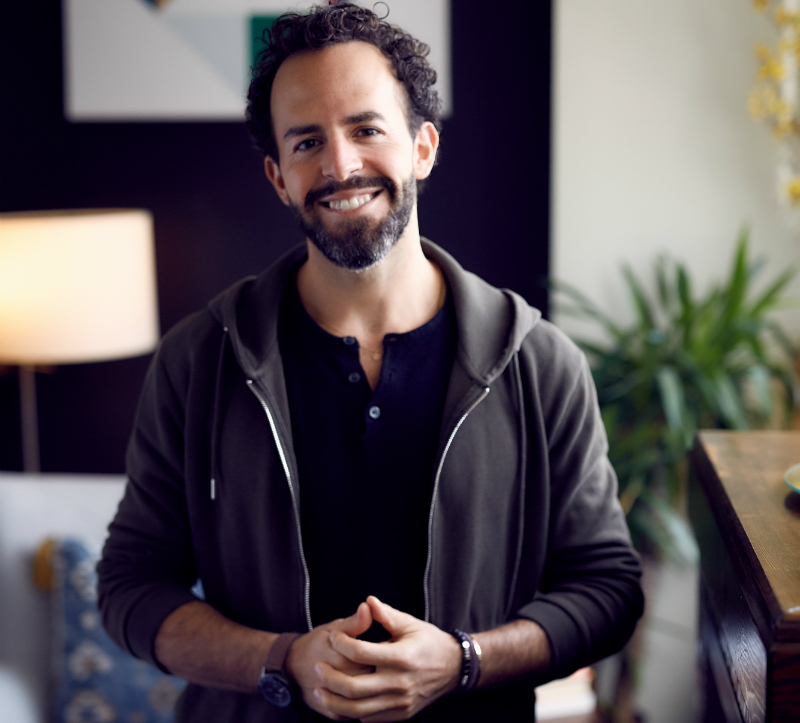
With over 45 million adult sufferers in Canada and the United States, anxiety is the most common mental disorder in North America. Julian Brass, an award-winning media and business advisor, learned to harness the power of his own anxiety to help others deal with theirs, as a public speaker and health coach. In 2008, Brass founded the Canadian media company Notable.ca, an online brand dedicated to driven young professionals. Brass, the author of Own Your Anxiety: 99 Simple Ways to Channel Your Secret Edge, trained and collaborated with yogis from India, as well as rabbis and priests in Jerusalem.
What does “own your anxiety” mean?
To own your anxiety is to take ownership of it and get to the source of what it’s trying to tell you. The book and its ideology is all about getting to the source of the fire, not just turning the smoke alarm off. I believe that anxiety is our smoke detector and the smoke – the anxiety – is coming up for a reason. And, generally speaking, it’s either a physiological reason or a metaphysical reason – the person we are being is not who we deep down want to be and the anxiety is sending us warning signs. It is our innate gift saying there is a problem and you know it. I am here to try and make you listen to it.
Who is this book for?
The book is for anybody who has feelings of anxiety or stress. Dr. Barry Kosofsky, one of the top neuroscientists and neurologists in the world, asked me when I was mid-way into writing it, “Who are you writing this for? The big A or the little A?” The big A refers to 10 per cent of anxiety sufferers and those are people who have clinical anxiety. The little A is the 90 per cent of anxiety sufferers who could benefit from changing their lifestyle and learning tools that will help them. By no means is this book supposed to be a substitute for a medical professional. However, I can say that it will improve anybody’s life in some way.
Why did you decide to write Own Your Anxiety?
After a year of living in Israel, I came back to Toronto and sold my business (Notable.ca), because I understood that my purpose was to serve and help people, so they don’t have to feel the pain I once did. To own your anxiety, all you need to do is learn basic tools that we are born with, but it’s about learning them and making them accessible. I spent the last two and a half years validating these different tips through both Western and Eastern research. The message is not to stop anxiety, it is about becoming empowered by the anxiety.
In your book, you set out 99 ways to reclaim your body, mind and soul. What are some of the key tips you talk about?
At the very beginning of the book, I talk about how to breathe for anxiety, which is crucial to activate the right part of the nervous system, while turning off the wrong part.
People need to move. Movement is key – any type of movement, such as walking, running, lifting weights, swimming, dancing. Not only is it healthy, but it’s medically proven to lower anxiety.
Mindfulness is deciding to be aware of how our mind is acting and thinking. The second we become mindful of what’s happening in our minds, we put ourselves in the driver’s seat of our lives. Why? Because our lives are a manifestation, or a result, of our thoughts.
Rituals are things that keep us calm and bring us back to centre, so we need to make time for rituals in our day. For example: praying – whether that’s at synagogue or at home; having a five-minute movement every morning, that can be a beautiful ritual; drinking a cup of water and saying thank you for the hydration can be a ritual. It’s about finding rituals that feel good to the individual and sticking with it.
Scientists suggest that a state of gratitude is the highest vibrational state that a human can put themselves in. You can give gratitude for absolutely anything.
Spreading love is a beautiful tool, in a world that, at times, feels like there is not enough love. When we choose to replace fear with love – i.e., anxiety with love – it is a lot harder to feel alone and anxious. Be intentional about your ability to give love to others. It can be as simple as smiling at someone you don’t know.
Put parameters on your phone use. We are attached and glued to these little anxiety machines by checking emails or getting to every text as it comes in and hearing that ding. The notifications on the phone are constantly releasing dopamine and they are making people very excited, so much so that it becomes addictive.
Why do youth have more anxiety than ever?
Social media has created this feeling of not being enough among way too many people. Another word for that is shame. Shame is one of the greatest causes of anxiety. I encourage people to always give themselves a compliment after they put their phone away and to remind themselves that they are looking at the highlight reel of other people’s lives. And that no one actually lives this perfect, glamorous, always happy, done-up life.
This interview has been edited and condensed for style and clarity
